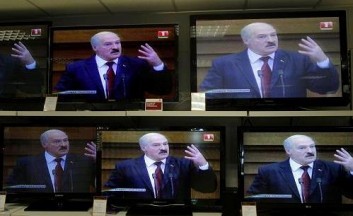Instability in Belarusians’ economic well-being directly affects President’s ratings
 The situation has not changed
The situation has not changed

A national survey conducted in July by the Independent Institute of Socio-Economic and Political Studies has shown a slower growth in public optimism. The President’s electoral rating has declined; however, there is no rise in protest moods.
Comment
Alexander Lukashenko’s fourth term in office is characterised by significant changes in public moods. In comparison to the previous term, fluctuations in the Belarusian people’s economic situations immediately affect the President’s rating and level of trust toward state bodies. However, such instability of public opinion does not influence the Belarusian people’s protest potential and presents no threat to the state order.
In contrast to Aleksander Lukashenko’s third term in office in 2006-2010, when his rating was about 40%, since 2010 the Belarusian leader has much less support from his voters. According to a survey carried out by IISEPS in June, only 29.7% of the respondents are ready to cast their votes for Lukashenko, while in March 2012, the electorate’s support equaled 34.5% (in December 2011 – 24.9%).
The most likely reason for this decline is the worsening of the economic well-being of citizens: in June, only 12.8% of the interviewees noted an improvement in their financial situation compared to 15.3% in March 2012.
However, sociological surveys do not register any rise in the popularity of alternative politicians or increased protest moods among society.
According to the same poll, the electoral rankings of Andrei Sannikau and Uladzimir Nyaklyaeu are 6.8% and 6.1% respectively, which is more likely explained by the inertial effects (After his release from prison in April 2012, Sannikau withdrew from public policy). The number of people who associate themselves with the opposition is at the usual level of 19.2% (against 22.6% in December 2011)
On the one hand, these figures prove a well-known opinion that despite expectations of changes, the majority of the Belarusian people do not see an alternative candidate among the opposition politicians. Consequently, they are not ready to participate in protest campaigns, for example, in street actions.
On the other hand, the link between the fluctuations in citizens’ economic well-being and the level of trust toward state bodies proves the opinion that after the 2011 financial crisis, the Belarusian authorities have only one effective tool to maintain and enhance people’s loyalty: to constantly increase welfare.
In such an unstable situation it should be expected that even a minor inflation hike or delay in wage or pension payment will lead to a further decline of public trust toward the authorities.
During 2011, several labour collectives at major Belarusian companies staged protests and as a result, their salaries were increased. If there is a new wave of economic crisis, these non –political protests are highly likely to occur again. Thus, if the Belarusian authorities fail to find funds to increase salaries quickly, social protests might theoretically grow into something bigger.
Subscribe to our newsletter




Situation in Belarus
Constitutional referendum: main consequences


 Video
Video
How to count the political prisoners: are the new criteria needed?


 Video
Video
Paternalism In Decline, Belarusian Euroscepticism, And The Influence Of Russia


 Video
Video












